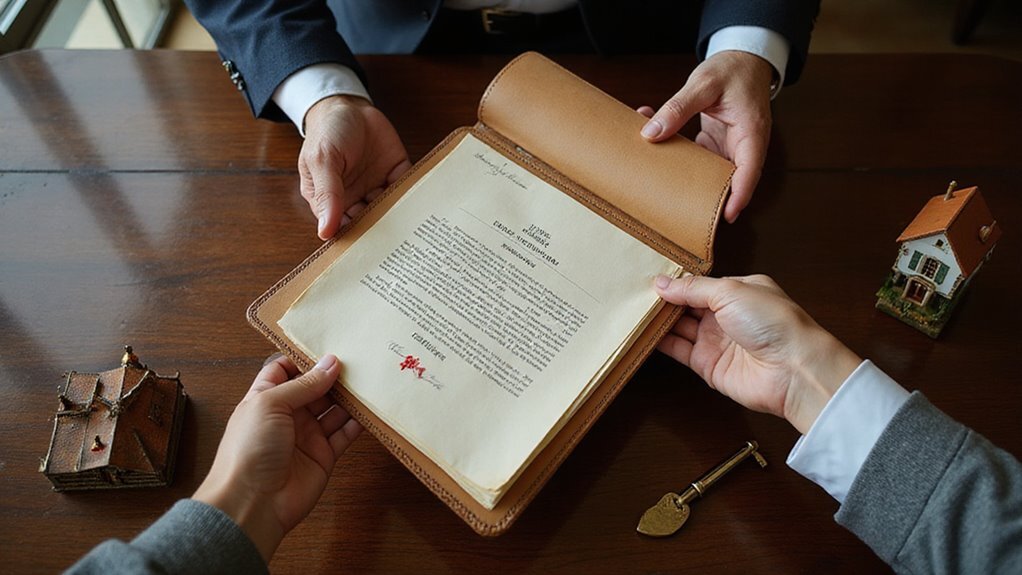Death’s final paperwork shouldn’t burden your loved ones with lengthy court battles and expensive fees. Probate proceedings can drag on for months or years, draining inheritance funds and causing unnecessary stress for families. Legal expenses, court costs, and administrative fees often consume significant portions of estates, leaving heirs with less than intended. A strategic property transfer before death eliminates these burdens, preserving wealth and ensuring smooth inheritance transitions.
Transferring property ownership through joint tenancy, Lady Bird deeds, or revocable living trusts creates direct paths to heirs. These legal tools bypass probate entirely, allowing immediate property transfers upon death.
This blog explores every aspect of avoiding probate when selling or transferring property before death.
Key Takeaways
- Use joint tenancy or tenancy by entirety to automatically transfer property to co-owners without probate.
- Establish a revocable living trust to hold and distribute your property outside probate court.
- Record a Lady Bird or Transfer-on-Death deed to pass property directly to beneficiaries upon death.
- Sell your home to cash buyers like Greg Buys Houses to bypass probate delays and legal costs.
- Regularly update beneficiary designations and legal documents to ensure smooth property transfer before death.
What Is Probate and Why Avoid It When Selling a House?

Probate means a court must oversee the transfer of property after someone dies. This legal process can take 6-12 months and cost thousands in court fees. Most people want to avoid probate when selling a house.
A house stuck in probate cannot be sold until the court approves all estate matters. The delays create stress for families and reduce property value. Smart planning prevents these issues.
Three main tools help bypass probate: revocable living trusts, joint ownership, and transfer-on-death deeds. These legal options allow quick property transfers without court involvement. As a result, families save time and money while reducing emotional strain.
What Are the Consequences of Probate for Home Sellers?
Probate creates significant delays and extra costs when selling a home after someone dies. The process typically takes 6 to 9 months before a sale can proceed. Court fees and attorney costs reduce the final value of the estate.
Legal requirements add complexity to any property transfer during probate. Multiple heirs must agree on sale terms. A judge needs to approve major decisions about the property. Court supervision fees range from 3% to 7% of the estate’s total value.
Practical solutions exist to minimize probate impacts on property sales. Proper estate planning tools help avoid probate entirely. Transfer-on-death deeds offer one way to bypass lengthy court processes.
How to Sell Your House to Avoid Probate?

You need to act now to transfer your property outside of probate through strategies like creating a revocable living trust, adding joint ownership with right of survivorship, or using transfer-on-death deeds. These options allow you to pass your house directly to beneficiaries quickly and without court delays. Don’t wait—taking these steps ensures a smooth, probate-free sale when the time comes.
Pre-death Property Transfer Options
Several legal options allow property transfer before death to avoid probate. Three main methods exist: joint tenancy with right of survivorship, Lady Bird deeds, and revocable living trusts. Each option serves different needs and situations.
Joint tenancy automatically transfers property to surviving owners. Lady Bird deeds let owners keep control while living but transfer property at death. Revocable trusts hold assets during life and distribute them according to specific instructions after death.
Moreover, these strategies reduce legal fees and prevent delays. Florida law requires proper documentation and specific language for each transfer method. Early planning protects assets and provides peace of mind.
Creating a Revocable Living Trust
A revocable living trust transfers your property to beneficiaries while avoiding probate court. A valid trust requires proper documentation, naming of trustees, and transfer of assets into the trust. The trust creator maintains full control during their lifetime and can make changes as needed.
The main benefits include privacy protection and reduced settlement costs for heirs. Your estate can skip lengthy court proceedings and save up to 5% in probate fees. Moreover, your beneficiaries receive assets more quickly.
Furthermore, this legal tool offers flexibility for changing circumstances. The trust remains private, unlike a will which becomes public record. Most states allow revocable living trusts without requiring attorney assistance.
Joint Ownership with Right of Survivorship
Joint ownership with right of survivorship transfers property directly to surviving co-owners when one owner dies. This legal arrangement bypasses the probate process entirely. The surviving owner receives automatic full ownership under state property laws.
Multiple owners can hold equal shares through this arrangement. The property passes smoothly without court intervention or delays. Each owner must be specifically named on the deed or title to establish valid joint tenancy.
For maximum protection, owners should consult an attorney. This strategy works well for spouses, family members, or trusted partners. Moreover, proper documentation ensures seamless transfers to survivors.
Transfer-on-Death Deed Options
Two main options exist for transfer-on-death deeds: traditional TOD deeds and Lady Bird deeds. Traditional TOD deeds allow direct property transfer to beneficiaries without probate in 29 US states. Lady Bird deeds serve as alternatives in states like Florida that don’t recognize standard TOD deeds.
Property owners can retain full control during their lifetime with either option. These deeds enable heirs to avoid probate costs, court delays, and public proceedings after the owner’s death. Subsequently, beneficiaries receive the property quickly and efficiently.
A properly recorded deed must include accurate property details and beneficiary information. Legal requirements vary by state, so consultation with a qualified attorney ensures valid documentation.
Lifetime Gift of Property
A lifetime gift lets you transfer property ownership to others while you are alive. This transfer avoids probate court proceedings after death. Your beneficiaries receive assets directly and immediately.
Four main options exist for gifting property: revocable living trusts, joint tenancy with survivorship rights, Lady Bird deeds, and outright gifts. Each method offers different tax and control benefits.
The right gifting strategy reduces legal hassles and costs for your family. Proper planning ensures smooth property transitions without court intervention. Early property transfers protect assets and provide peace of mind.
What Legal Instruments Can Help Bypass Probate?

To avoid probate, you need to use legal tools that transfer your property directly to your beneficiaries. Living trusts, transfer-on-death deeds, and joint tenancy are the most effective options, but each requires proper legal setup. Act now to choose the right instrument and ensure your property passes smoothly and quickly.
Understanding Living Trusts
A living trust is a legal arrangement that transfers your assets to beneficiaries without probate court involvement.
The trust holds your assets while you’re alive and automatically distributes them after death according to your instructions. This setup offers complete privacy since no public court records exist. Your heirs receive assets much faster through direct transfer.
Key benefits include maintained control of assets during your lifetime, reduced legal expenses, and simplified estate administration. The trust document clearly specifies how property should pass to loved ones. Moreover, living trusts can be modified or revoked at any time while you’re alive.
Benefits of Transfer-on-Death Deeds
Transfer-on-Death deeds allow property to pass directly to beneficiaries after death without probate. These legal documents bypass standard court proceedings and reduce estate costs by up to 40%. Your property remains fully under your control during your lifetime.
The process offers significant flexibility and security for property owners. You can change or revoke the deed anytime before death. Your beneficiaries cannot claim any ownership until after your passing.
Furthermore, beneficiaries automatically receive the property title upon death verification, typically within 30 days. This quick transfer protects assets and provides immediate access to inherited property.
Joint Tenancy Advantages
Key advantages of joint tenancy include automatic property transfer and probate avoidance. Upon death, property passes directly to surviving joint tenants without court involvement or delays. This seamless transfer protects families from lengthy legal processes. The arrangement reduces costs by eliminating probate fees and attorney expenses.
Joint tenancy requires proper documentation through deeds or titles that specify rights of survivorship. Your family members should understand these ownership arrangements. Regular reviews help maintain accurate records and ownership details. A simple discussion with an estate attorney can establish effective joint tenancy arrangements.
How Fast Can You Sell a House in Probate?

A typical probate house sale takes 6 to 9 months to complete. The process requires multiple legal steps and court approvals before finalizing the sale.
Three main methods exist for selling probate properties: standard probate sales (6-9 months), nonprobate sales (71 days), and court-approved sales (3-6 months). Each option offers different benefits and timelines.
Several factors affect the sale duration. Legal requirements must be met first. Then, creditors need time to file claims. Finally, potential disputes between heirs could extend the timeline further. As a result, sellers should plan ahead and choose the most suitable sale method for their situation.
What Are the Costs of Selling a House in Probate vs. Avoiding Probate?
Probate home sales cost significantly more than non-probate transfers. Court fees and attorney costs for probate typically range from 3% to 7% of the home’s value. The probate process takes 6 to 9 months on average, increasing holding costs and maintenance expenses.
Alternative methods offer substantial savings. A Lady Bird deed or revocable trust allows quick property transfers without court involvement. These options reduce legal fees and eliminate lengthy waiting periods.
Moreover, non-probate transfers help families avoid estate taxes and minimize conflicts between heirs. Smart estate planning can save beneficiaries thousands in unnecessary expenses and weeks of delays.
How Can Cash Home Buyers Help Avoid Probate Complications?

Cash home buyers help avoid probate complications by purchasing properties directly from estates with immediate payment. A cash sale can reduce the typical probate timeline from 6-12 months to just a few weeks. This direct transaction method bypasses many court requirements and legal obstacles.
The benefits extend beyond speed alone. Cash buyers often handle paperwork, court filings, and other legal requirements as part of their service. Moreover, immediate access to funds allows heirs to settle estate debts and distribute inheritances quickly.
In practical terms, estates receive full payment without waiting for traditional buyer financing or court proceedings. This straightforward approach reduces stress and prevents common probate delays that often burden grieving families.
Conclusion
Planning ahead to avoid probate is crucial for protecting your family’s financial future. Several legal tools can help transfer property ownership before death. Taking action now prevents costly court proceedings and reduces stress for your heirs.
At Greg Buys Houses, we understand the challenges of managing property transfers in Pensacola and nearby Florida cities. We help homeowners explore various options for avoiding probate through proper estate planning. Our team specializes in providing solutions for seamless property transitions.
If you’re considering selling your house to avoid probate complications, we offer quick and hassle-free purchases. We assist property owners throughout Florida with their real estate needs. Our expertise ensures a smooth transaction that helps prevent future probate issues for your family.

